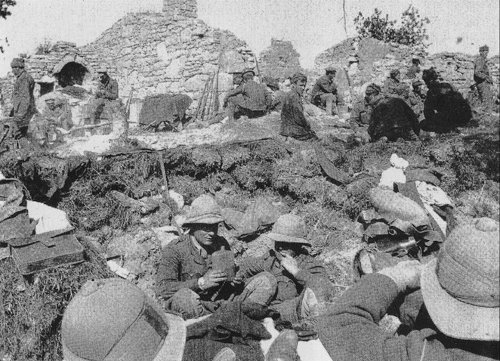06 May 1915
HELLES - SECOND BATTLE OF KRITHIA - Ordinary Seaman Joe Murray, Hood Battalion, 2nd Naval Brigade, RND - Hamilton ordered the attack at Helles which became known as the Second Battle of Krithia which began on on 6 May. The plan looked to the capture of Achi Baba, but the reality as the troops moved forward into a chaotic advance. What happened to the Hood Battalion as they felt there way forward up Achi Baba Nullah to the left of the French was typical. To them the Turks were completely invisible; but their bullets seemed to be everywhere.
 Photograph: The Hood Battalion resting at the White House, 6 May 1915
Photograph: The Hood Battalion resting at the White House, 6 May 1915
"There's no sign of the French. It was a beautiful morning. We got to a farmhouse, what was left of them, knocked about but serviceable. We were lying alongside the corner of a vineyard, a bush hedge, 3 or 4 feet high a little ditch on the side. We started numbering. There must have been at least 50-60 men there. Then we were told to swing round behind the house and move forward. We found ourselves alongside another hedge of the vineyard. There was a big gap, about 12 feet wide, it looked like the roadway into the farm house. We lay there for a little then we were told to bear left, we were at the junction between the French and the British and we tried to keep connection with both flanks. We kept losing so many men we couldn't do it. We could never locate these snipers. There were no trenches; it was open fighting. We had to rush along the front of the house and go through this gap. Only four people got through, we had to climb over the dead and the wounded. We got about 10 yards in front, and down we went. The bullets were hitting the sand, spraying us; you were spitting it out of your mouth."
Murray found himself isolated with just his three companions in front of the hedge. Not knowing what to do they decided to keep on trying to push forward.
"I remember, Yates was just a little ahead of Don [Townshend] and I. We crawled up more or less line abreast but the bullets were hitting the sand, spraying us, hitting our packs. So we decided, "How about another dash?" Off we went. Near enough fifteen yards, one drops, everybody drops. We got down again! We decided to go a little bit further. We'd got to keep bearing to our right slightly, because we seemed to be dodging the line of fire. But it was still whinging overhead and flying about, hitting the ground. I think it must have been a machine gun. But there's a tendency for a man, if he's being fired on by two or three men at the same time, to think it a machine gun. You couldn't see them and there was a rattling going on, not only in our section but all over the place. Rapid fire was going on. We decided to go a little bit further and all four got up together. Yates was in front and all of a sudden he bent down. He'd been shot in the stomach, maybe the testicles, but he was dancing around like a cat on hot bricks, fell down on the ground. We decided to ease up a little bit. But as soon as we got somewhere near him he got up and rushed like hell at the Turks and "Bang!" Down altogether, out for the count. Horton and I were more or less together. Townshend was on the other side and there was a gap where Yates had been. Young Horton, he was the first to get to Yates and he got a hold of him and sort of pushed him to see what was wrong when a bullet struck him dead centre of the brow, went right through his head and took a bit out of my knuckle. Poor old Horton. He kept crying for his mother. I can see him now. Hear him at this very moment. He said he was eighteen, but I don't think he was sixteen, never mind eighteen. He was such a frail, young laddie. He was a steward on the Fyfe banana boats in peacetime. Yates was dead. Horton was dead. Only Don and I left."
The attack on 6 May was a failure all along the line.
"SOURCE:
IWM Sound Archive, J. Murray, AC 8201
